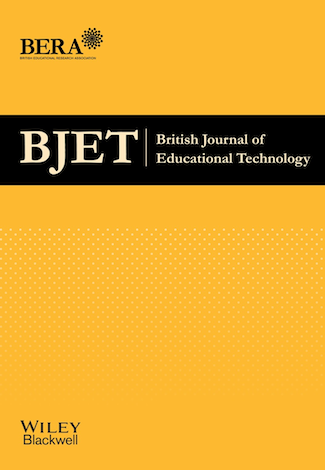
What are the learning affordances of 3‐D virtual environments?
ARTICLE
Barney Dalgarno, Mark J. W. Lee
British Journal of Educational Technology Volume 41, Number 1, ISSN 0007-1013 e-ISSN 0007-1013 Publisher: Wiley
Abstract
This article explores the potential learning benefits of three‐dimensional (3‐D) virtual learning environments (VLEs). Drawing on published research spanning two decades, it identifies a set of unique characteristics of 3‐D VLEs, which includes aspects of their representational fidelity and aspects of the learner–computer interactivity they facilitate. A review of applications of 3‐D VLEs is presented, leading to the identification of a series of learning affordances of such environments. These affordances include the facilitation of tasks that lead to enhanced spatial knowledge representation, greater opportunities for experiential learning, increased motivation/engagement, improved contextualisation of learning and richer/more effective collaborative learning as compared to tasks made possible by 2‐D alternatives. The authors contend that the continued development of and investment in 3‐D games, simulations and virtual worlds for educational purposes should be considered contingent on further investigation into the precise relationships between the unique characteristics of 3‐D VLEs and their potential learning benefits. To this end, they conclude by proposing an agenda or ‘roadmap’ for future research that encompasses empirical studies aimed at exploring these relationships, as well as those aimed at deriving principles and guidelines to inform the design, development and use of 3‐D virtual environments for learning.
Citation
Dalgarno, B. & Lee, M.J.W. (2010). What are the learning affordances of 3‐D virtual environments?. British Journal of Educational Technology, 41(1), 10-32. Wiley. Retrieved August 7, 2024 from https://www.learntechlib.org/p/187505/.
Cited By
View References & Citations Map-
Mobile virtual reality for musical genre learning in primary education
Edoardo Degli Innocenti, Dept. of Information Engineering, Italy; Michele Geronazzo, Dept. of Architecture, Denmark; Diego Vescovi, Dept. of Information Engineering, Italy; Rolf Nordahl & Stefania Serafin, Dept. of Architecture, Denmark; Luca Andrea Ludovico & Federico Avanzini, Dept. of Computer Science, Italy
Computers & Education Vol. 139, No. 1 (October 2019) pp. 102–117
-
Investigating the process of learning with desktop virtual reality: A structural equation modeling approach
Guido Makransky & Gustav Bøg Petersen
Computers & Education Vol. 134, No. 1 (June 2019) pp. 15–30
-
An Australian and New Zealand scoping study on the use of 3D immersive virtual worlds in higher education
Barney Dalgarno, Mark Lee, Lauren Carlson, Sue Gregory, Belinda Tynan & Belinda Tynan
Australasian Journal of Educational Technology Vol. 27, No. 1 (Jan 01, 2011)
-
Virtual Representations in 3D Learning Environments
Miri Shonfeld & Miki Kritz
Interdisciplinary Journal of E-Learning and Learning Objects Vol. 9, No. 1 (Jan 01, 2013) pp. 249–266
-
Three Dimensional Virtual Environments as a Tool for Development of Personal Learning Networks
Aggeliki Nikolaou, Greece; Costas Tsolakidis, University of Aegean, Greece
International Journal of Emerging Technologies in Learning (iJET) Vol. 8, No. 2013 (Jan 31, 2013)
-
Towards a Psychological Model for Learning in Avatar-based Virtual Environments: How Important is Spatial Processing?
Patricia Boechler, Heather Gautreau, Erik deJong & Peter Sterling, University of Alberta, Canada
EdMedia + Innovate Learning 2018 (Jun 25, 2018) pp. 2075–2083
-
Reflecting on using a theory seeded methodology for designing and building effective 3D Multi-User Virtual Environments for vocational education
Todd Cochrane, Nelson Marlborough Institute of Technology; Nikki Davis, Department of Centre Institution; Julie Mackey, Department or Centre Institution
ASCILITE - Australian Society for Computers in Learning in Tertiary Education Annual Conference 2013 (2013) pp. 162–166
-
Art Education Avatars in Action: Preparing Art Teachers for Learning and Teaching in a Virtual Age (for Special issue Digital Games and Simulations in Teacher Preparation)
Lilly Lu, Northern Illinois University, United States
Journal of Technology and Teacher Education Vol. 19, No. 3 (October 2011) pp. 287–301
These links are based on references which have been extracted automatically and may have some errors. If you see a mistake, please contact info@learntechlib.org.
